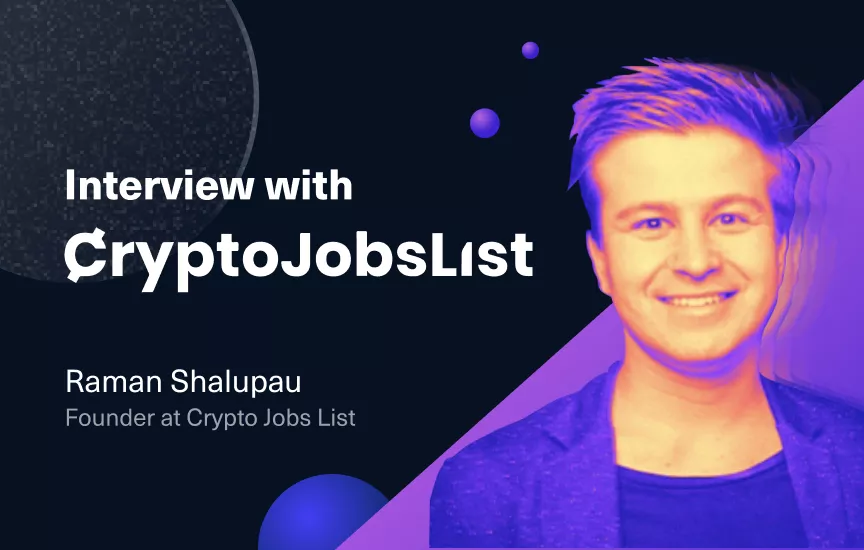Quit a job thanks to crypto profits or get a job in crypto space to have even more profits? This interview will make you think
Our guest today is Raman, founder of Crypto Jobs List. Raman was looking for a job in the crypto space and went on to creating Cryptojobslist.com, #1 job board for crypto and blockchain companies. In this interview he is walking us through his own crypto adventure and sharing insights from inside the hiring process.
— Could you introduce yourself please? Just a few words about yourself and your project.
Sure, so I’m Raman, the founder of CryptoJobsList, the leading job board for blockchain and cryptocurrency jobs. I started back in 2017 and so far we have almost 4 000 jobs from over a thousand companies (exchanges, protocol companies, wallets, Web3, DAOs, DeFi startups, NFT startups, and so on) and about 57 000 applications. Using this platform you can just apply to jobs, create a time profile page, benchmark your salary against other people who work in crypto space. We do a bunch of other things, everybody can check out our stats — we try to be as transparent as possible.
— How did you come up with the idea of creating Crypto Jobs List?
After I first heard about crypto and BTC in 2014, I was still busy with my previous startup. It wasn’t very successful and ended up sunsetting. I was realizing that if I were to get a full-time job again it might as well be in crypto, since engineering is my main background. I was applying to engineering positions in crypto companies and my experience was pretty tough. In 2017 it was also very hard to find all opportunities in one place or just find them in general and I realized that I can put together a list of jobs in crypto. I’ve heard job boards are a thing and apparently they could be successful. I think that’s where the project took off and I quickly realized the most important part here is not about the business, but it’s more about helping grow the crypto community and helping grow the crypto ecosystem overall.
There’s one big myth that you need to have a PhD in math to be able to work in crypto which is very far away from the truth.
— What are crypto companies looking for when hiring?
Generally I would categorize all the opportunities that companies post on Crypto Jobs List into two general camps: technical and non-technical positions. There’s one big myth in crypto that you need to have a PhD in math to be able to work in crypto which is very far away from the truth. There are a lot of non-technical positions. Within non-technical positions — content marketing, community management, meme generation — every project typically needs several people who are able to execute those functions. And I think that’s one of the easiest ways to get into crypto space especially if you’re non-technical. Some companies even post complete meme jobs ad that go viral. Those jobs are real, these companies just want to attract the right people and they know if they write it in crypto style, they will attract the right people who understand the language. And within technical, I think the biggest demand would be for solidity developers right now, because EVM is such a popular execution environment and there are a lot of chains that are adopting it outside of Ethereum itself. But there is a high demand for more traditional tech roles: devops, webdev, back-end, front-end. Designer positions is a bit of an interesting space: I’ve been noticing way too many designers wanting to work in the crypto space but there are not enough open positions which is kind of surprising.
That’s something that I usually recommend people to do — start writing. You can just write your opinions, share your journey in the cryptocurrency space, share what you learn. I think that’s one of the great ways of getting started if you’re non-technical.
— What is your advice to people who are looking to make a career change?
Be on Twitter — I think that’s probably number one. Also — try to consume as much content as you can. And I think a very important part that maybe some people don’t take for granted is to actually use crypto. It’s important to use as many things as you can find and try to interact with them. I think the aerial experience starts when you create your first wallet, understand how the private public key security works, learn more about how to make sure your keys are secure, make sure not to share your seed phrase with anyone, make your first transactions. The best type of learning is just by using products.
The next step — try writing. I think writing is a very underrated activity. It helps structure your thoughts, summarize your learnings, realize how much actually you learned. And most importantly you can show that piece of writing to a hiring manager. A few links to your blog posts will definitely make your resume stand out when applying for jobs.
— What is the average salary in the crypto space?
I think overall the salaries in crypto space are 20% higher for crypto specialists and those who have been in the space. But at the same time I’ve also seen that some salaries are slightly lower than certain traditional roles. There are too many people who want to be in crypto and I think this is quite reasonable sometimes to compromise on the salary level just for the sake of learning and being in the industry because the actual payouts quite often are through the airdrops or through the tokens. And those rewards can be much higher than the actual nominal base compensation. It also depends on the nature of the company, how early you are in that company, and so on.
— How do crypto companies differ from the others?
The DNA of most crypto companies is very different to the DNA of a lot of Silicon Valley startups or traditional Web 2.0 startups where the control is all centralized, there’s a lot of secrecy and internal trust between employees. And majority of projects in crypto are open source, they have a community, they have a Twitter, Telegram, Discord presence, sometimes there is no even clear leader or the leaders can change. I think in crypto it’s much more fun to have things open source and especially if it’s a product that a lot of people use.
— How soon do you think crypto will go mainstream?
I think one of the VCs in the US once said that “The future is already here—It’s just not very evenly distributed”. So I definitely subscribe to that statement, there are a lot of people who are already living in the future and for them it’s everyday life. They have minimal savings in traditional fiat systems and majority of their funds are in crypto. There are some people who are on the way towards that. We’re also seeing more and more crypto initiatives from very big companies. I think it brings more attention to crypto pretty much from everyone in the world.
— Where do you want to bring your platform? Do you have a vision?
I’m just here to help crypto space grow through the means of hiring and ideally letting people find the right position for themselves. I believe that everyone should be working on the project that they meant for him at that point in life. There should be no reason why you’re stuck at a boring job or the job that doesn’t fully suit you. You should be able to easily switch positions or join another company, another project. And the same thing goes for founders and hiring organizations. A lot of success in the space depends on the team members and we’re just here to help match both sides of the market.



